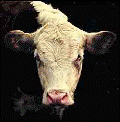Animal Science, Department of

Department of Animal Science: Dissertations, Theses, and Student Research
First Advisor
Andrea K. Watson
Date of this Version
5-2023
Document Type
Thesis
Abstract
A finishing experiment evaluated the effect of incremental supplemental rumen-protected lysine on beef cattle performance. All cattle were fed the same diet of high moisture corn, dried rolled corn, modified distillers grains plus solubles, corn silage, and supplement with inclusion levels of lysine ranging from 0 to 7 grams/day, in 1 g increments. Dry matter intake (P 0.04) and ADG (P ≤ 0.04) decreased linearly as supplemental lysine increased in the diet with no effect on final carcass adjusted feed efficiency (P ≥ 0.34). In the initial 64 days of the experiment, increasing lysine in the diet linearly decreased ADG (P ≤ 0.05) with a trend (P = 0.08) to linearly decrease feed efficiency. During the Optaflexx feeding period, DMI decreased linearly (P ≤ 0.01) with no effect on carcass adjusted ADG (P ≥ 0.51) or feed efficiency (P ≥ 0.34). Hot carcass weight tended to decrease linearly (P = 0.07) with no significant differences in carcass quality characteristics (P ≥ 0.20). In diets containing 15% modified distillers grains plus solubles, increasing supplemental lysine in the diet did not improve performance of finishing cattle.
A finishing experiment evaluated the effect of a pistachio shell-sourced biochar on emissions and finishing performance of beef cattle. All cattle were fed the same diet of dried rolled corn, Sweet Bran (Cargill Wet Milling, Blair, NE), wheat straw, and supplement with biochar replacing 0.5% of dried rolled corn in the biochar treatment group. Eight pens of cattle were rotated as pairs through a 2-chambered emissions barn for 5 days for 8 consecutive weeks to analyze CH4 and CO2 produced by the cattle (2 measurement periods per pair). Biochar tended to increase CH4 emissions on a g/day basis (P = 0.09) with no effect on CH4 emissions as g/kg of DMI. There were no statistical differences in CO2 emissions as g/day or g/kg of DMI. Final performance, HCW, LM area, and marbling, did not differ between treatments (P ≥ 0.23). However, the control group tended to have improved 12th rib fat (P = 0.07) and yield grade (P = 0.06) compared to the biochar group. Including biochar at 0.5% of diet DM did not reduce eructed CH4 or respired CO2 and did not improve performance.
Advisor: Andrea Watson


Comments
A THESIS Presented to the Faculty of he Graduate College at the University of Nebraska in Partial Fulfillment of Requirements for the Degree of Master of Science, Major: Animal Science,Under the Supervision of Professor Andrea K. Watson, Lincoln, Nebraska:May 2023
Copyright © 2023 Hanna K. Cronk